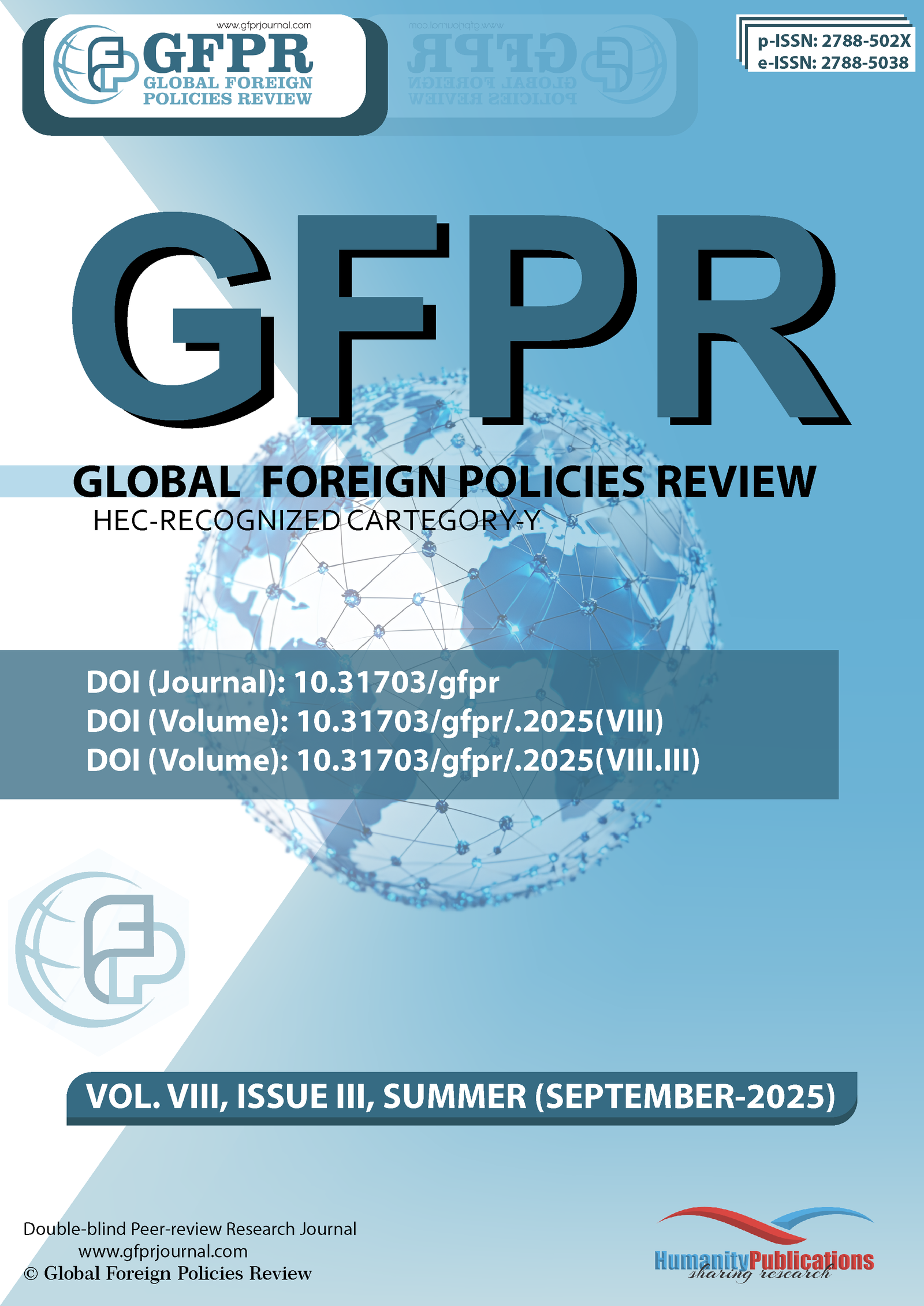01 - US Withdrawal from Afghanistan: An Analysis of the Root Causes
http://dx.doi.org/10.31703/gfpr.2023(VI-IV).0110.31703/gfpr.2023(VI-IV).01 Published : Dec 2023
Afghanistan has remained under the rule of different powers but none of them could completely control it and had to leave it for different reasons. World powers had a keen interest and intervened in the state but could not stay there for long. This study has mainly focused on exploring the main causes behind the US withdrawal from Afghanistan. The study was conducted using qualitative data from... Details
-
Taliban, Afghanistan, Intervention, Causes, Withdrawal.
-
(1) Mahnoor Shahid
Post Graduate Scholar, Department of Political Science, Women University Mardan, KPK, Pakistan.
(2) Uroosa Ishfaq
Lecturer, Department of Political Science, Shaheed Benazir Bhutto Women University Peshawar, KPK, Pakistan.
(3) Kashif Ashfaq
Lecturer, Department of Pakistan Studies, National University of Modern Languages Islamabad, Pakistan.
02 - Indo-US Nuclear Deal: Implications for Pakistan
http://dx.doi.org/10.31703/gfpr.2023(VI-IV).0210.31703/gfpr.2023(VI-IV).02 Published : Dec 2023
Indo-US nuclear deal a critical understanding between America and India, was signed in 2008. Even though India wasn’t a member of the Non-Proliferation Treaty (NPT), this agreement granted essential autonomy to India for obtaining nuclear technology and fuel for peaceful reasons. The development of India's nuclear capabilities has dramatically enhanced the nation's energy security and per... Details
-
NPT (Non-Proliferation Treaty) , NSG (Nuclear Suppliers Group), India, United States, Pakistan
-
(1) Muhammad Azmat
Undergraduate, Department of International Relations, COMSATS University, Islamabad, Pakistan.
(2) Muhammad Ahsan
Undergraduate, Department of International Relations, COMSATS University, Islamabad, Pakistan.
(3) Sana Asghar
Undergraduate, Department of International Relations, COMSATS University, Islamabad, Pakistan.
03 - Understanding the Nexus Between Afghan Taliban and TTP: Challenges and Opportuni
http://dx.doi.org/10.31703/gfpr.2023(VI-IV).0310.31703/gfpr.2023(VI-IV).03 Published : Dec 2023
This paper delves into the intricate dynamics of Afghanistan's relationship with Pakistan, especially in light of a potential Taliban resurgence and its repercussions on Tehrik-i-Taliban Pakistan (TTP). The TTP's strategic realignment, transitioning from collaboration with the Afghan Taliban to destabilizing Pakistan, is examined through a qualitative approach rooted in structural realism. The ... Details
-
Tehrik-i-Taliban Pakistan, Afghan Taliban, CPEC, Power Dynamics, Cease-fire Diplomacy, Militant Groups, Geopolitical Dynamics, Regional Security, Proxy Conflicts
-
(1) Musa Kaleem
Undergraduate, Department of International Relations, National University of Modern Languages (NUML), Islamabad, Pakistan.
(2) Sajid Iqbal
Assistant Professor, Department of International Relations, National University of Modern Languages (NUML), Islamabad, Pakistan.
04 - Germany's Response towards Russia-Ukraine Conflict
http://dx.doi.org/10.31703/gfpr.2023(VI-IV).0410.31703/gfpr.2023(VI-IV).04 Published : Dec 2023
The Russia-Ukraine war has had a profound impact on energy security in Europe, with Germany facing unique challenges and opportunities as one of the largest energy consumers in the region. This case study examines the implications of the conflict on energy security, focusing on Germany's response. It analyzes the reasons behind Germany's support for the project, such as diversification of energ... Details
-
Russian-Ukrain conflict, Germany, Energy sector, Challenges, Opportunities.
-
(1) Hafsa Iqbal
Undergraduate, Department of International Relations, COMSATS University Islamabad, Pakistan.
05 - Melting Ice, Rising Tensions: China's Arctic Presence and Implications for the U
http://dx.doi.org/10.31703/gfpr.2023(VI-IV).0510.31703/gfpr.2023(VI-IV).05 Published : Dec 2023
The Arctic Ocean Region is experiencing a transformation and is remoulding abruptly from an ice-covered region to an economic zone, influenced by the rising Global temperatures. This transformation has unplugged new avenues for maritime activities as well as intensified the Geopolitical dynamics. This study investigates and analyzes the rising tensions prompted by the increasing presence and ac... Details
-
Melting Ice, Arctic Ocean, China, US Global Temperature
-
(1) Virda Azam
Undergraduate, Department of International Relations, National University of Modern Languages (NUML), Islamabad, Pakistan.
(2) Sajid Iqbal
Assistant Professor, Department of International Relations, National University of Modern Languages (NUML), Islamabad, Pakistan.

 Volume IX, Issue I (Winter 2026)
Volume IX, Issue I (Winter 2026)  Volume VIII, Issue IV (Fall 2025)
Volume VIII, Issue IV (Fall 2025)  Volume VIII, Issue III (Summer 2025)
Volume VIII, Issue III (Summer 2025)  Volume VIII, Issue II (Spring 2025)
Volume VIII, Issue II (Spring 2025)  Volume VIII, Issue I (Winter 2025)
Volume VIII, Issue I (Winter 2025)  Volume VII, Issue IV (Fall 2024)
Volume VII, Issue IV (Fall 2024)  Volume VII, Issue I (Winter 2024)
Volume VII, Issue I (Winter 2024)  Volume VI, Issue IV (Fall 2023)
Volume VI, Issue IV (Fall 2023)  Volume VI, Issue III (Summer 2023)
Volume VI, Issue III (Summer 2023)  Volume VI, Issue II (Spring 2023)
Volume VI, Issue II (Spring 2023)  Volume VI, Issue I (Winter 2023)
Volume VI, Issue I (Winter 2023)  Volume V, Issue IV (Fall 2022)
Volume V, Issue IV (Fall 2022)  Volume V, Issue III (Summer 2022)
Volume V, Issue III (Summer 2022)  Volume V, Issue II (Spring 2022)
Volume V, Issue II (Spring 2022)  Volume V, Issue I (Winter 2022)
Volume V, Issue I (Winter 2022)  Volume IV, Issue IV (Fall 2021)
Volume IV, Issue IV (Fall 2021)  Volume IV, Issue III (Summer 2021)
Volume IV, Issue III (Summer 2021)  Volume IV, Issue II (Spring 2021)
Volume IV, Issue II (Spring 2021)  Volume IV, Issue I (Winter 2021)
Volume IV, Issue I (Winter 2021)  Volume III, Issue I (Fall 2020)
Volume III, Issue I (Fall 2020)  Volume II, Issue I (Fall 2019)
Volume II, Issue I (Fall 2019)  Volume I, Issue I (Fall 2018)
Volume I, Issue I (Fall 2018)